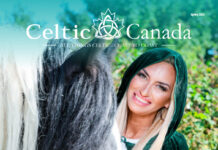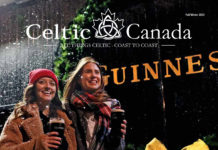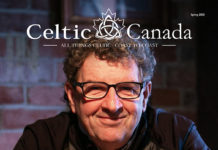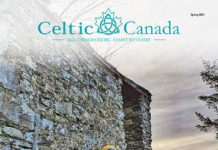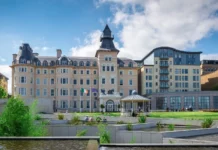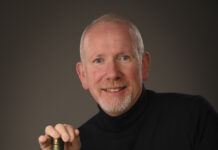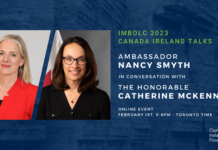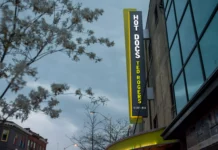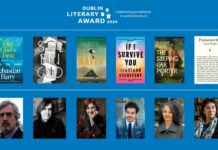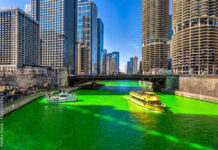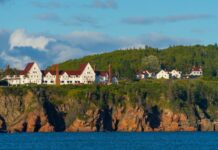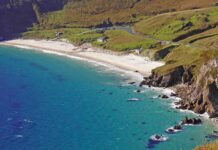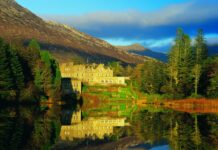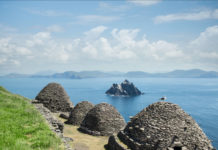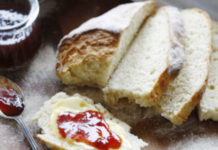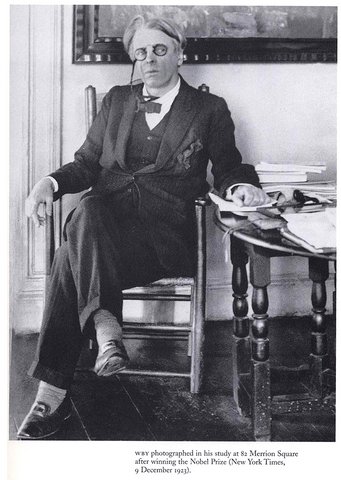William Butler Yeats was born in Dublin on June 13, 1865. With Lady Gregory and others, he founded the Irish Literary Theatre, from which developed the Abbey Theatre, Dublin, in 1896.
His poetry includes Mosada (Dublin, Sealy, Bryers & Walker, 1886); The Wanderings of Oisin and Other Poems (London, Kegan Paul, 1889) Crossways, 1889; The Rose, 1893; Poems (London, Unwin, 1895); The Wind Among the Reeds (London, Elkin Mathews, 1899); In the Seven Woods (Dublin, Dun Emer Press, 1903); The Green Helmet and Other Poems (Dublin, The Cuala Press, 1910); Poems Written in Discouragement 1912-1913 (Dublin, The Cuala Press, 1913) Responsibilities (The Cuala Press,1914); The Wild Swans at Coole (The Cuala Press, 1917. Enlarged edition, London, Macmillan, 1919); Michael Robartes and the Dancer (The Cuala Press, 1921); Later Poems (London, Macmillan, 1922) The Tower (London: Macmillan, 1928) The Winding Stair (New York: Fountain Press, 1929/ London, Macmillan, 1933); Words for Music, Perhaps (The Cuala Press, 1932); The Collected Poems (New York: Macmillan, 1933); A Full Moon in March ([plays and poems] London, Macmillan, 1935); Parnell’s Funeral and Other Poems (1935); New Poems (The Cuala Press, 1938); Last Poems and Two Plays (The Cuala Press, 1939/ MacMillan, 1940); The Poems (all the poems intended for publication by Yeats, edited by Richard J.Finneran. London, MacMillan/Dublin, Gill and MacMillan, 1983); and The Collected Poems (Revised 2nd ed. Ed. Richard Finneran. New York: Macmillan, 1989).
His plays include The Countess Cathleen (1894); The Land of Heart’s Desire (London, Unwin, 1894); The Shadowy Waters ( London, Hodder & Stoughton, 1900); Cathleen ni Houlihan (London, Bullen, 1902); The Pot of Broth (1902); The Hour Glass and Other Plays (London and New York, Macmillan, 1904); The King’s Threshold (Bullen, 1904); On Baile’s Strand (Bullen, 1904); Deirdre (London, Bullen/Dublin, Maunsel, 1907); Two Plays for Dancers (Dublin, The Cuala Press, 1919); Four Plays for Dancers (London, Macmillan, 1921); Plays in Prose and Verse (with Lady Gregory. London, Macmillan, 1922); The Cat and the Moon (poems and play. Dublin, The Cuala Press, 1924); Sophocles’ King Oedipus: A Version for the Modern Stage (Macmillan, 1928); The King of the Great Clock Tower (The Cuala Press, 1934); The Herne’s Egg (Macmillan, 1938); and Purgatory (The Cuala Press ?,1939).
His prose includes Fairy and Folk Tales of the Irish Peasantry (London, Walter Scott/New York, Thomas Whittaker/ Toronto, W.J. Gage, 1888); The Celtic Twilight (London Lawrence & Bullen, 1893); The Secret Rose (London, Lawrence & Bullen,1897); The Tables of the Law (1897); The Adoration of the Magi (1897); Ideas of Good and Evil (London, Bullen, 1903); John Millington Synge and the Ireland of His Time (Dublin, Cuala Press, 1911); Per Amica Silentia Lunae (London, Macmillan, 1918); The Cutting of an Agate (New York, Macmillan, 1912); Reveries Over Childhood and Youth (The Cuala Press, 1915); The Trembling of the Veil (London, Laurie, 1922); Plays and Controversies (essays and plays. London, Macmillan, 1923); A Vision (London, Laurie, 1925); Autobiographies (London, Macmillan, 1926); Letters to the New Island (Cambridge, Harvard University Press, 1934); Wheels and Butterflies (plays. London, Macmillan, 1934); Dramatis Personae (autobiography. Dublin, The Cuala Press, 1935); Essays, 1931 to 1936 (Dublin, Cuala Press, 1937); and If I Were Four and Twenty (Dublin, Cuala Press, 1940).
Among the many biographies of Yeats are W.B.Yeats: A Life by R. F. Foster. Volume 1: The Apprentice Mage. (Oxford University Press, 1997); and W.B. Yeats: A Life: Arch-poet 1915-1939 v. 2 (OUP, 2003).
He was a member of the first independent Irish Senate from 1922 until 1928, when he oversaw the design of the first Free State coinage. He was awarded the Nobel Prize for Literature in 1923. He died on January 28, 1939, on the French Riviera, and was buried in Rocquebrune. In 1948, his remains were brought back to Ireland and reburied, according to his wishes, in Drumcliff graveyard, in the shadow of Ben Bulben mountain in County Sligo, where an ancestor had been rector.
Cast a cold eye
On life, on death.
Horseman, pass by!
W.B.Yeats Reading His Own Verse
posted by brychar66
William Butler Yeats – The Second Coming
The Second Coming
by William Butler Yeats (1865-1939)
Turning and turning in the widening gyre
The falcon cannot hear the falconer;
Things fall apart; the centre cannot hold;
Mere anarchy is loosed upon the world,
The blood-dimmed tide is loosed, and everywhere
The ceremony of innocence is drowned;
The best lack all conviction, while the worst
Are full of passionate intensity.
Surely some revelation is at hand;
Surely the Second Coming is at hand.
The Second Coming! Hardly are those words out
When a vast image out of Spiritus Mundi
Troubles my sight: somewhere in sands of the desert
A shape with lion body and the head of a man,
A gaze blank and pitiless as the sun,
Is moving its slow thighs, while all about it
Reel shadows of the indignant desert birds.
The darkness drops again; but now I know
That twenty centuries of stony sleep
Were vexed to nightmare by a rocking cradle,
And what rough beast, its hour come round at last,
Slouches towards Bethlehem to be born?
Nobel Speech at Nobel Prize.org
W.B. Yeats at the National Library of Ireland
Source: Irish Writers online




